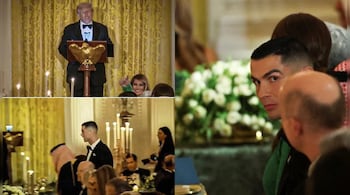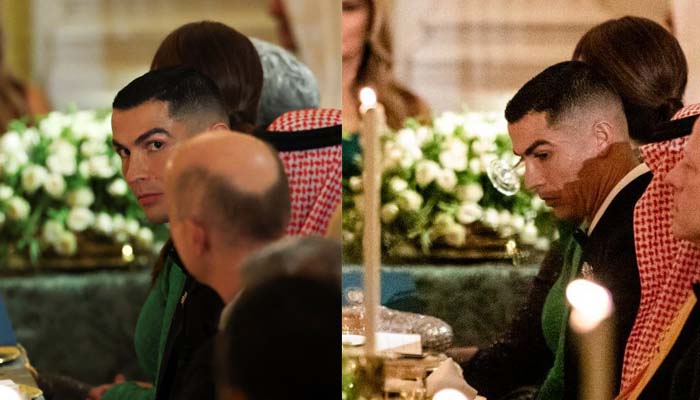NEWS
JUST IN: Ronaldo Personally Toasts Saudi Crown Prince at Lavish Dinner While Trump SHOCKINGLY Reveals Barron Is a Die-Hard Ronaldo Fanboy — But Then Drops the Real Bombshell: Saudi Arabia Is About to Pour $1 TRILLION Into America Because “Only I Could Make This Happen” — And Whispers Are Swirling That Trump Is Quietly Pushing to Hand Over America’s Top-Secret Riyadh… Even Though Saudi Is Cozier With China Than Ever Before — Sparking Total Panic in the Pentagon! PLUS: Insiders Claim the Grand Canyon Itself Is Now on the Table for a Saudi Mega-Resort Takeover — You Won’t Believe What Trump Said Behind Closed Doors… “I Can’t Believe This Is Actually Happening — Full Jaw-Dropping Details Inside!”

Recent social media chatter surrounding a private dinner in Saudi Arabia has drawn attention to the country’s ongoing use of high-profile international figures to support its global visibility efforts. Cristiano Ronaldo, who has been a central figure in Saudi Arabia’s expanding sports sector, was reportedly present at a high-end event attended by senior Saudi officials. While neither Ronaldo’s representatives nor Saudi authorities have confirmed any specific details, such gatherings are consistent with the kingdom’s strategy of linking sports, culture, and investment diplomacy.
In the United States, former President Donald Trump referenced Ronaldo in recent remarks to supporters, noting that his son Barron is an enthusiastic admirer of the football star. The comment preceded broader statements from Trump suggesting the possibility of significant Saudi investment in the U.S. economy. No documentation or official Saudi communication supports claims of a $1 trillion commitment, but the comments align with Trump’s frequent focus on international investment during campaign appearances and private donor events.
The remarks have circulated against a backdrop of ongoing scrutiny surrounding U.S.–Saudi relations. Successive American administrations have worked to maintain a strategic partnership with Riyadh while monitoring the kingdom’s increasingly close engagement with China, particularly in technology and energy sectors. Analysts say these developments have introduced additional complexity into Washington’s long-standing security and economic ties with Saudi Arabia, prompting close attention to any new proposals or political statements involving the region.
Online speculation has also emerged regarding the possibility of foreign-backed development projects near major U.S. landmarks, including the Grand Canyon. There is no evidence that any such discussions have taken place, and federal regulations governing national parks make large-scale commercial development highly unlikely. Experts note that while foreign investment in U.S. tourism infrastructure is not uncommon, claims involving federally protected lands often originate from misinterpretations or exaggerated commentary.
The combination of celebrity involvement, political rhetoric, and geopolitical tension has contributed to the rapid spread of unverified narratives across digital platforms. Officials and analysts caution that no major policy changes or investment agreements have been announced by either government. However, the renewed focus on U.S.–Saudi dynamics suggests that the relationship will remain a subject of public interest, especially as global alignments and domestic political campaigns continue to evolve.













